CLIENT SHOWCASE
2020 Clients
Jude Anderson-Clutz - The Welsh Baker
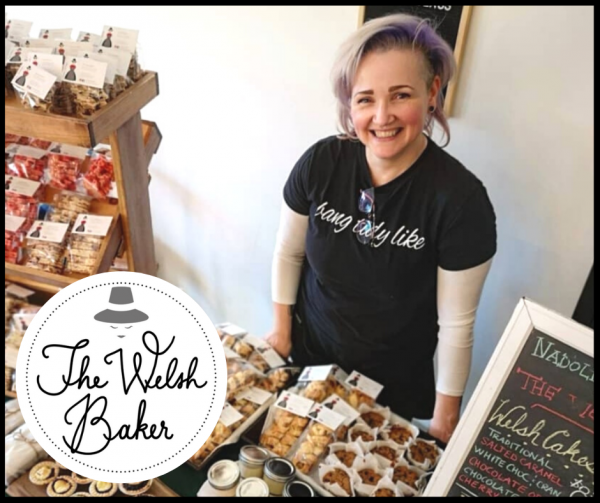
Tell us about yourself
My family emigrated to Canada the year that I was born and being Welsh Canadian has always been a big part of my identity. I remember warm Welsh Cakes were always a special treat. I went on to train and work as an American Sign Language Interpreter for over 20 years and then spent some time in social service coordination. It is meaningful work and I am honoured to have served but my passion, my dream has always been to create, to bake and to bring joy. And so I left my full time career with benefits and a pension and decided to live my dream of being a baker.
Tell us about your business
I established The Welsh Baker in 2018 and sold at one small but busy farmer’s market while I held down my full time job. One year later I was renting a commercial kitchen space full time, baking for 4 markets and I even appeared on a television baking show! The Welsh Baker is a small batch artisanal baking company that celebrates timeless recipes with a modern flare or two. I started only making Welsh Cakes but now I offer a wide variety of baked good, catering menus and cooking classes.
Has your business been impacted by COVID-19?
My business has been impacted. One of the markets that I previously sold at decided not to open this year. This market was my busiest venue. Fortunately, the community rallied together and found a new venue. I have also had to update my website to include e-commerce and look at ways to collaborate with other businesses to keep interest and innovation flowing.
What led you to start this business?
Trying out a new recipe is exciting but making something that you have made hundreds of times-that recipe you know by heart-is as close to meditation as I am likely to achieve and seeing people you love enjoying what you have made?
Leaving the security of what you know to begin something new can be scary. One day while packing up to move house, I came across an old journal. In it was an entry about how I dreamed of owning my own food business. I knew then that I didn’t want to be 5, 10, 15 years from that moment and regret that I never took the chance.
What were some of the challenges you faced getting started and how did you overcome them?
One of the biggest challenges was finding the right people to go to for advice. The Small Business Centre was very helpful in this regard. I was able to find folks who could reliably be asked for advice on insurance, writing contracts, hiring employees, bookkeeping etc. There are a lot of great people out there who are willing to help out a small business but I had some interactions with people who really knocked the wind from my sails at times. Thankfully, the great people helped me get back on course.
As a busy entrepreneur, what do you like to do when you take a break?
I power down. Take a break from social media and just enjoy spending time with my husband. We both love great food and drink so finding and trying out the new places and frequenting our old faves always helps me to unwind
What’s in the future for your business?
I want to have my own brick and mortar space that is close to home so that the long hours I need to put in at the kitchen don’t completely overtake my family life. I can’t wait to have people come to see my little space in the world and hopefully give them a smile and something good to eat.
Sylvia Zietek - Pierogi Queen Food Truck
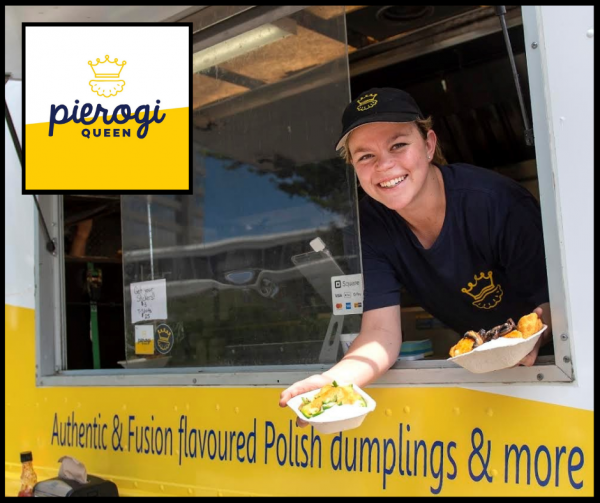
Tell us about yourself
Since I can remember, pierogi have been a staple in my household and our love for good food has always brought our family together, not only on holidays but on any day of year.
I was born and raised in London, Ontario by two hardworking and loving parents who had recently immigrated to Canada from Poland.
I went to Catholic Central High School before heading to the University of Ottawa to study linguistics which led me to explore my love of language and culture. I backpacked through Europe and Central and South America, learning about different cultures and cooking. I’ve worked in various restaurants for a decade, mainly in London and Port Stanley, including The Wortley Roadhouse, in front-of-house and back-of-house positions as well as management for Kelsey’s, and GT’s On the Beach.
In 2018, I completed Fanshawe’s Entrepreneurship certificate program, which led me to a great opportunity with the College’s LeapIN Incubator, a 9 week summer program that focuses on mentorship, business growth, and supports start-ups with seed funding and one-on-one in-depth business analysis. This ultimately gave me the confidence and push I needed to make my food truck dreams a reality.
Tell us about your business
Pierogi Queen Food Truck is in the tail end of its second season and has been open since May 2019 offering curbside, event, and catering services. We focus on authentic and fusion flavoured handmade Polish pierogi, ranging from Traditional potato and pressed cheese, to Buffalo Chicken, to seasonal dessert Blueberry or Apple Pie and everything in between. We showcase the freshest local fillings for each handmade pierogi paired with various toppings. Other Eastern European inspired menu items that you will find include our Pork Schnitzel Sandwiched with garlic aioli, caramelized onions and mushrooms, and pickles on pumpernickel rye as well as our Polish Dill Pickle Fries.
Has your business been impacted by COVID-19?
We were delayed by opening by at least two months, scrapping all of our spring and summer planned events. In the early days of COVID-19, we offered porch drop offs and packages in collaboration with our food truck friends. We’ve been fortunate enough to carry on with our season and have implemented COVID-19 protocols, and while circumstances have continued to change the way we interact with our customer base, we have adapted by relying less on mega festivals and events, and turning more towards shorter, more contained, community events put on by the London Food Truck Association. Continuing to work with other trucks to offer these types of events has allowed for patrons to visit multiple trucks, enjoy a meal outside, and still feel safe while practicing physical distancing. We’ve also hired less staff, behind the scenes and on the truck, in an effort both to minimize contact throughout the food preparation process and in response to not requiring the same level of staff typically needed for extended service.
What led you to start this business?
It started out as an ode to my babcia (grandma) and mom and grew from a place of wanting to carry on tradition through the power of food. Somehow, I wanted to turn that desire into a career outside of the standard serving jobs I held in the restaurant industry. I’ve never been a 9-5 person and have always loved the way food bonds people from different backgrounds and walks of life and brings them to the same table. Pierogi have always been one of my favourite foods ever since my babcia handed me a rolling pin at the age of 4 and told me to get to work, and I suppose I took that very literally. Starting a food truck allowed me the freedom to take my food anywhere and offer a constantly rotating menu to cater to any crowd, and hopefully give them an unforgettable experience in the process. An added bonus as an owner/operator in a male dominated industry is that I’m in a unique position to show other aspiring female entrepreneurs that they can follow their dreams and be their own bosses in whichever industry they choose and that continues to drive me today.
What were some of the challenges you faced getting started and how did you overcome them?
Legitimizing the business of street food and gaining the public’s support in small urban cities has always been a challenge. I was lucky to start my food truck at a time when the tide had mostly shifted as a result of the tireless efforts of Food Truck owners before me and the door had been opened to encourage new food trucks to join London’s growing culinary culture and food truck scene. And still, there were a lot of hoops to jump through and systems to navigate in realizing my business plan. Throughout the entire process of licensing my business, securing the truck, getting it up to Code and everything in between, I found that getting involved with well connected organizations such as the Small Business Centre, Fanshawe’s LeapIN Program, and working with the London Food Truck Association and other seasoned food trucks gave me support I needed to make my start that much more welcoming and seamless.
Is there anything currently happening in the London business community that excites you?
The completion of the Dundas St. flex street has been a long time coming and has only started to scratch the surface of what it may be able to offer the City of London. We know that businesses in the core have been especially impacted by COVID-19 and ongoing construction, and so the focus has rightfully been on supporting these businesses at this time. But we are excited to get the chance to park downtown again and be apart of the flex street and community culture that it is seeking to support and develop.
What’s in the future for your business?
I’ve always considered opening up an all year-round market location or even a second truck one day. Until then, my focus is on ways to grow the business while simultaneously figuring out how to keep up with demand and maintaining the high quality of our food and keep the pierogi handmade. We have been experimenting and looking for ways to offer our pierogi when the food truck season eventually ends. In the last few months, London’s Church Key Bistro has been sourcing our blueberry dessert pierogi and featuring them on their dessert menu, and we plan to continue this through the winter. We will be offering some holiday packages and limited pre orders for customers to order pierogi in bulk, a service we don’t typically offer while the truck is operational. We are always looking for ways to give back to our community and support more socially aware events, teaming up with local service providers and staying true to the vision of pierogi and good food being a strong unifier even in times of uncertainty.
Krista Pellow - Refine Digital Media
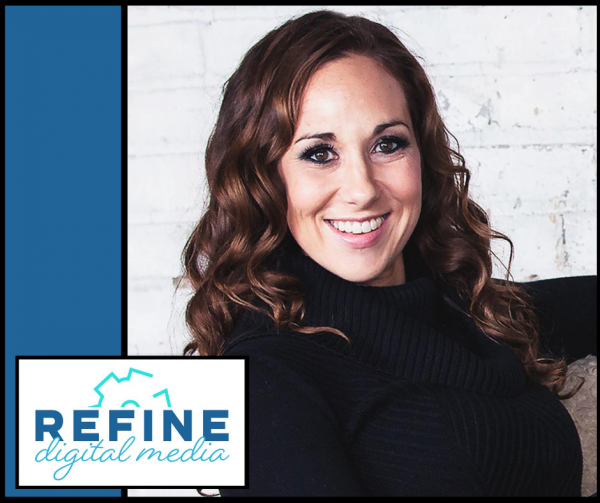
Tell us about yourself
Thank you, London, for taking time to learn more about me and Refine Digital Media.
My Name is Krista Pellow, and I was born and raised in the Forest City. I’ve been a professional Graphic Designer for 15 years working for various printing and design firms, freelancing design, content strategy consulting and management. I graduated with an advanced diploma in Graphic Design, a post graduate in 3D Animation and most recently studied my Bachelor of Professional Arts. I am also a mother to two incredibly sweet, funny and energetic children. My Daughter is 10 and my Son is 3.
Throughout my working career, I have gained a wide variety of experience in many applications of media, design, and client relations. This cocktail of skills has allowed me to successfully work hand in hand with clients to properly determine the needs of their business with a people driven focus. My vision has always been people-focused and directed by my own personal standards of what I would expect from a service + product lead business. I have built a wide variety of leadership skills, time management applications, as well as teaching and training programs in various capacities, which allow me to adapt to many unique situations in business. I am driven and motivated by my children and supported by my husband to set an example for our kids that hard work pays off.
Tell us about your business
Refine Digital Media became a full-time business in 2018, under the name Refine Design • Creative Content Strategies and has recently taken on a new name inspired by refining the streams of services we offer our clients. Refine Design was originally named and registered as my freelancing design business name in 2010, the year my Daughter was born.
Refine Digital Media is a creative design and digital media agency. Our core services pillars are: Custom Graphic Design, Brand Development, Digital Media & Marketing, Content Strategies, Web Development and Digital Advertising Support.
Refine Digital Media focuses on the unique digital marketing, design and media management needs of our clients. Our foundation and primary focus builds solutions as a partner to our clients to foster those relationships and services. We help guide strategic support across a variety of marketing platforms and remain engaged with clients, providing accountability in the process. We are dedicated to building trusted relationships and business growth with ongoing support and operate as an extension of the businesses we serve.
Has your business been impacted by COVID-19? If so, how have you adapted?
Leading up to Covid-19, I had begun working with my junior design strategist and planning internship positions to develop and launch marketing initiatives for the business, creating new division planning and streamlining our client onboarding process. When Covid-19 shut down everything but essential businesses, I had to lay off my dedicated employee and pause internal growth planning. All the focus was directed 100% on supporting the client base to help them weather the storm the pandemic was serving up to their businesses. Some clients were forced to close the doors and some were able to operate as essential businesses. One thing they had in common was that they needed to drive their online presence more strongly than ever. Web development, paid advertising and digital presence as a whole was paramount. Launching all my focus into supporting those needs allowed me, in the process, to refine client support and made it clear where the direction of the business was headed. It was before the reopening phases of Covid-19 that, while I had to put the development of growth for my own business on hold, I was able to determine the needs and future direction of Refine. This included clients and the services we can provide for them. I dialed back down to the core of what this business model is: An extension of the client’s business first. Refine Digital Media was a natural evolution from Refine Design – Creative Content Strategies. It’s been streamlined with additional areas for support and production.
What led you to start this business?
Before I completed my first diploma in Graphic Design, I was already working part time in the industry as well as freelance and volunteer design jobs. These were great ways to grow my portfolio with a goal to achieve a full-time position as a Graphic Designer. I worked for PinPoint Publications in London, and Sun Media in Woodstock both before and after my Daughter was born. When she was two, I returned for additional schooling and then began teaching at Fanshawe. Additionally, I was managing at GT’s on the Beach in the summer months along with designing their menus and promotional materials.
It was when I was on maternity leave in 2017 after having my Son that I decided it was time to think about what it would take to turn my freelance ‘side job’ into a ‘real job’. So, with a 7-year-old and a new born at home, in the summer of 2017 I began surveying existing clients and friends for what it was about me that they valued most and keep coming back for; what were the main skill sets and services they had received that made them realize the value they found in what I provided. I then began building upon this feedback, in review of my skill sets, to determine what would translate effectively into a sustainable business. I also spent a great deal of time considering what it was I wanted to focus on and where I thought I could lead the business. I felt many times that summer like just throwing in the towel at the whole idea. I even told my husband I was ready to look at a different career stream all together! To his credit, he pushed me farther and encouraged me to see what I could make of this business first. (In my defense, I was sleep deprived with a 3-month-old at the time and still trying to work on other jobs.)
Was there something that pushed you into being an entrepreneur?
I suppose it would sound cliché to say that it was something I had always planned for and/or conditioned myself for business, but that’s fairly accurate. I began selling (not giving) my drawings and paintings to my family members at the age of four, with a full sales process including payment receipts. I then moved onto the digital platforms and coined the title “Working with Computers Pellow”. To be fair, I was under the impression that everyone used business title since my father was a dentist: “Dr. Pellow”.
Fast-forward a few decades to juggling a young family and three jobs all in different business streams: management, teaching and design. I knew that when my maternity leave ended after having my son, I wouldn’t be able to focus my attention on all three as well as my family. I needed to have more control over my schedule, family time, childcare, school, after-school sports and overall family-work-life balance. Having developed this range of skills, it was finally time to see what I could make of it. I was already working all hours of the day, weekends, nights (you know the drill…), so it was time to do it for myself!
What is the #1 small business book/blog/website you would recommend?
Traction – Get a Grip of your Business. It’s incredibly insightful for any size of business. It’s personal and direct, and gets you thinking in all directions of business, independent of the industry you’re serving. The systems throughout the book are so bendable for any style of business and management focus.
What advice would you give to someone starting a small business today?
Know your worth and the value of the services and products you provide. It’s very easy to get into a pattern of giving discounts, providing lower rates or doing extra work for free.
Don’t undervalue your skill set, abilities and unique offerings. Focus on your business model and niche areas of expertise. Trying to do everything that even slightly aligns with your business can easily get out of control. Know what you do, and what you don’t, and what it’s worth. Always strive to work to your highest level. Hire skill sets that you lack so that you can delegate or defer the rest, and don’t sweat the small stuff.
Alejandra Valencia - Prisma Photography Studio
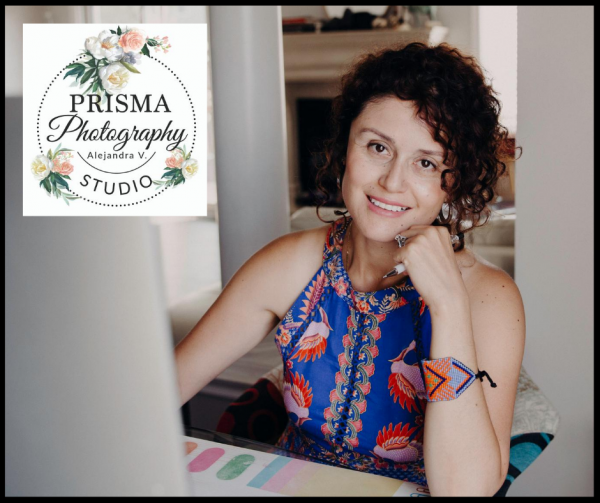
Tell us about yourself
I am an early riser and I love everything about coffee. I believe in Jesus Christ as my Lord and Saviour. I am very visual and love every opportunity to create, design and photograph. For over 10 years, I have been helping individuals and businesses stand out through smart and engaging content and design. As a photographer I love capturing social and special moments with a unique creative approach and an uncommonly fast turn around. I was born in Colombia and completed a Graphic Design program before coming to Canada in 2002.
I am a third generation photographer, both my grandfather and father were professional photographers. I grew up seeing how they work, the cameras they used, how they developed their own pictures, and even how they managed their business and clients. It was a different world then.
I graduated from the University of Western from Journalism and, in combination with a Multimedia Design and Production program from Fanshawe College, I was able to work on companies as Marketing Coordinator, Creative Specialist, Graphic Design and Photographer, and Creative Lead. From these positions I gained the experience and confidence to start my own business.
Tell us about your business
Prisma Photography Studio was officially born in 2017. I adopted the name for my business from my grandfather’s business in the 1940s, – Foto-Prisma. Currently I have hired photographers and editors on demand, depending on the amount of weddings I get per season. I also hire graphic designers when projects for graphic design are combined with my photography packages. Some of my clients that have hired my photography and graphic design services (excluding wedding and portrait customers) are: Lazar Law Firm, IMMPLOY, Forest City Talks, Deb Crowe, Innovation Works, D’Larche Community Service, Shang Gong Chinese MedCine Clinic, Mayne Products, Konnexio Engineering, Wastell Homes, Rico Chicharron, Oh Crepes!, Cowell Carpentry, Trudell Medical International.
My services include:
- Wedding Photography
- Engagement Photography
- Wedding and Elopement and Candid Storytelling
- Portrait Sessions for Professionals + Food Photography (Corporate Image, logo and brand design)
- Product Photography (Corporate, and brand design)
- Family Photography Sessions
- Newborn Photography
- Boudoir Photography
- Business Events and Conferences
- Graphic Design and Corporate Design
As a business owner I strive to give back to the community. I sponsor organizations such as: London Forest City Talks, Redemption Bible Chapel, The Aeollian Hall – El Sistema
Has your business been impacted by COVID-19? If so, how have you adapted?
Before COVID-19, showing up on networking events, managing social media, and all the rest was hard work – no doubt about that.
With COVID-19, the challenge was making a commitment to keep showing up consistently and figuring out ways to let customers know my business was still available for future bookings. I discovered COVID-19 – 2020 was an opportunity to grow in areas I didn’t explore before. I had to come up with a new mindset to continue marketing my business on social media, and be present. I challenged myself to use social media to create a system that made sense for me and my business, and map out my content. It was all about having a plan and being able to adjust as life/business unfolds. I had to create a posting schedule one week at a time. I divided my content in caption categories and photo topics with images that I would regularly incorporate on social media to give an inside of my business without having to sell my business. I learnt that I had to make an effort to customize my content and know who I was intending to reach when marketing my business on social media.
COVID -19 became the time to do something wild and crazy with my business. I reached out to every one of my old customers directly, personalized my services and offered my services boldly. I became purposely present on social media and have bookings for 2021. Despite this year’s challenges that came to us all, for me personally, it has been a blessing. I have a new routine in place that includes sharing office space with my husband at our dining table while homeschooling my kids, learning new recipes, going for bike rides with my family, taking courses to upgrade my skills, working as a graphic designer and even gaining a bit of weight – booo! I’ll keep showing up, learning, serving without fear, still dreaming and trusting everything is going to be OK.
What is the #1 small business book/blog/website you would recommend?
I am always reading and looking for inspiration. I personally find a lot of guidance and wisdom in the Christian Bible for every aspect of my life, including business and money. I also like to keep up with the new trends in the economy and my industry. I like to follow https://www.entrepreneur.com/ and also https://www.hubspot.com/. A must read is “High Performance Habits” by Brendon Burchard. Good to Great, by Jim Collins, The Essays of Warren Buffett, by Warren Buffett, and Deep Work: Rules for Focused Success in a Distracted World, by Cal Newport, and How to Win Friends and Influence People, by Dale Carnegie.
What’s the best business advice you’ve ever received and why?
A friend entrepreneur said “Everyone is lucky” but “few are prepared.” I always wondered how to best prepare for my next “lucky” opportunity. I searched and prayed for methods of preparation then I realized that being prepared was the relentless pursuit of following my dream. I found a mentor who kept me motivated and didn’t let me forget my “Why”. Preparation taught me I needed consistency, so I became consistent. My mentor kept me going while I kept bettering myself through my business. I started giving my uber best to every project, every photoshoot and everyone I meet. Preparation is showing up every time – I wake up early and go to bed late. I learned that preparation is saying you’re sorry, you’re welcome, and how can I help you (sometimes in the same sentence). Preparation is also falling down…then getting back up again. The best piece of advice is to be prepared. I realized that if we are not willing to prepare, then, we will never get lucky. So, don’t forget: The more prepared we are, the luckier we get!
What advice would you give to someone starting a small business today?
My advice to a starting business would be to buy a calendar and plan your time through the year. Have passion, strong will and be emotionally focused to make good decisions. Take care of your well-being, get over being self-centered, and remember that your body needs rest and nutrition to be creative and have the proper energy to keep up. Stay in shape on the spiritual side. Find a mentor. Book reflection time on your calendar so you can reflect on your days and go back to see if you can do things better, or differently.
Dustin Dinoff - Sightline
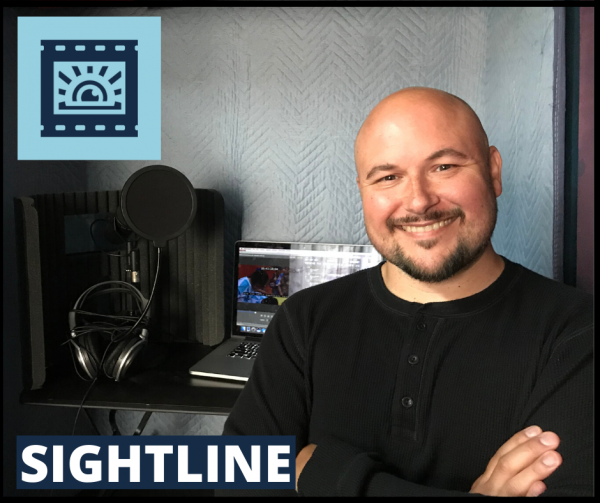
Tell us about yourself
I was born and raised in and around Toronto, and graduated from Humber College School of Journalism. After a few of years as a staff writer for an entertainment trade magazine, I transitioned to a screenwriting career. Together with my writing partner, we sold a feature film script, served as staff writers on a TV series and filmed some of our own work. It was very satisfying, a lot of fun, but my paycheques were sporadic. In order for my wife and I to be able to start our family, I understood that I needed a more predictable income source, and took an ongoing freelance gig as a closed captioning transcriptionist for a post production company that offered accessible media at a time when described video was becoming more of an essential feature for programming. Because of my experience in screenwriting, it was a natural fit to move me into writing the DV scripts for the company as well. Eventually I transitioned from transcription to captioning, and gradually expanded my client base until my earnings demanded I start up as a proper accessible media company. I was very reluctant, because I had no idea what I needed to do to run a proper business. After we moved to London, my wife encouraged me to attend an information session for the Small Business Centre’s Starter Company Plus program, and I immediately saw how it was going to be able to help me fill in those pieces of my business acumen that were missing, specifically sales and marketing. I was accepted into the program, and I’m very grateful for the Small Business Centre’s guidance and support, and couldn’t be happier with how everything has turned out.
Tell us about your business
Sightline primarily offers offline closed captioning for pre-recorded film, TV programs or any other piece of media content. Sightline also performs descriptive video, meaning the audio that guides someone in the blind or low-vision communities through the action in a piece of content. I perform most of the work myself in my home studio, but I do have a small roster of contractors – transcriptionists and voice talents – I can rely on in a pinch. This is my ninth year in the business, but my second as a business owner through Sightline.
Has your business been impacted by COVID-19? If so, how have you adapted?
I wasn’t sure how my business would be affected, because there were just so many unknowns in the beginning, but there was no doubt in my mind that it would be impacted in some way. The big question for me with Sightline was, if production stops for an indefinite amount of time, where is the content going to come from? But fortunately, broadcasters had spaces left in their programming schedules where cancelled or postponed live broadcasts had once been penciled in. The Olympics being cancelled is a good example, because it accounts for dozens and dozens of hours worth of programming across several broadcasters, and not just the Games itself, but all of the televised qualifying events leading up to it. All of those large programming blocks that were allotted for the 2020 Games were suddenly wide open, so some of those broadcasters turned to previously-aired sporting events to fill the time-slots. A lot of that programming suddenly needed a proper offline closed captioning element to pass CRTC regulations. I was very fortunate that some of that work came to me, and it was the kind of content that an offline captioner like me doesn’t get a crack at too often – high level amateur sports, and things of that nature. So I’ve adapted in the coronavirus era by simply keeping myself open to any business opportunity. I know some people have been taking it easier during the pandemic, but I’ve made sure I’m working harder than ever, and that my clients know that Sightline can be counted on during both good times and more challenging times. Hopefully that will pay dividends if there’s a second wave, and when the world and entertainment biz digs itself out from this and production resumes.
What led you to start this business?
For me it was the pursuit of a lifestyle. I worked in an office as a journalist just long enough to know that it wasn’t my thing. Many of my favourite people thrive in an office setting, but for many reasons, I knew I would be more productive and successful doing my own thing, my own way. Closed captioning was always on my radar, because it uses so many of the same skills as journalism, but it’s such a small, niche facet of the entertainment business that I was never able to find a way in. I got there eventually, and as a job it was everything I had hoped it would be. But it was just “a job” until it became necessary to take the steps to turn it into a proper business. It was a weird path to get into entrepreneurship, but it was the right path for me – there was a “too much, too fast” moment a couple years into my closed captioning career where I had to step back and admit to myself I wasn’t ready to hang my own shingle, because although I knew the job, I didn’t know how to run the business. But now, almost 10 years in, I have the lifestyle I was chasing (which has really helped with my kids during the pandemic), and I’m making a good living, which I thought was the part I’d have to sacrifice to have the lifestyle.
What were some of the challenges you faced getting started and how did you overcome them?
Sales. I was absolutely mortified of making cold calls and doing that nuanced sort of dance you sometimes need to do to bring a potential client around to understanding why they need not only your service, but you, particularly, to do it. In the beginning I was a mess. I’d get tongue-tied during meetings, and once completely fell apart on a potential client’s voice mail. I still don’t know what happened; my mind just went blank. The challenge was, I found that after working in my cozy, little freelancer bubble for so long, when I finally had to get out there as the face of my own business, I had trouble finding my voice for how long I had been in the shadows. But entering the SBC with an open mind during the Starter Company Plus training sessions, I got better and I overcame that challenge through repetition, trying and trying again, and now it’s almost like a muscle memory thing when I approach a potential new client.
As a busy entrepreneur, what do you like to do when you take a break?
Nothing makes me happier than my kids. My daughters really brought everything into focus for me, and I spend as much time as I can with them. I’m also still screenwriting and, after years of near-misses, finally have a movie coming out soon. It’s called Linked, I co-wrote it with the same guy I’ve been writing with since 2002, and it’s a thriller about the dangers of giving too much of yourself away on social media. It’s a lot of fun, and the good news about making a movie for a guy like me is, there is so much waiting around on a film set, that there was no interruption to my captioning work. I think the cast and crew thought I was on my laptop so much because I was rewriting scenes, or maybe working on something new, but no, I was captioning a series about how to train out-of-control puppies.
If you could sit down with any business leader or industry expert, who would you choose and why?
I would gladly sit with any business leader or industry expert who isn’t providing proper closed captioning with their online materials. I would suggest that business-related content really should be properly captioned, in the interest of expanding a company’s reach and message to the 3.5 million deaf, deafened, hard of hearing and oral deaf Canadians out there. I would extend that messaging to municipal governments, as well. So many of the cities, regions and towns in Canada that post their public city council and committee meetings on YouTube rely on automated captions, which can be terribly misleading for the assumptions the AI is forced to make, leaving a caption-user either confused or misinformed about the things going on where they live. Once I finally found myself in this line of work, I realized how much I take my senses for granted, and I can’t imagine how frustrating it must be to not have the same access to information about things happening in my own community as the people who don’t face the same challenges. I mean, these aren’t toy unboxing videos, or TikTok dance tutorials. They are public meetings about very real issues that impact all of our lives, and automated captions just don’t cut it. Everyone deserves the same opportunity to know what’s going on in their community.
What advice would you give to someone starting a small business today?
Grow at a pace you’re comfortable with, because “too much, too fast”, or being forced into growth for the sake of chasing a quick buck, can derail the original vision for your business that first inspired you to chart your own course.
Kari Martene - MeleKare
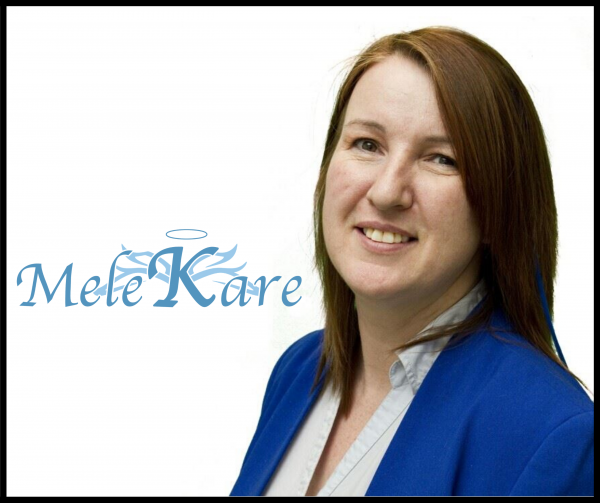
Tell us about yourself
I grew up in a small town in Huron County. My father was an carpenter and my mother was a registered nurse. They both were small business owners. My father operated an orchard, and a summer drive in restaurant. My mother invested into rental properties, with my father maintaining and repairing the properties. So my understanding of entrepreneurship was something that I grew up with.
I moved to London in 2008. I live with my 4 children ranging in ages from 24 to 10. I am an animal lover, owning 1 dog, 2 cats, 4 budgies and 1 rabbit.
Tell us about your business
I opened my business, MeleKare, in 2012. I’d seen a need for a home medical supply store that really listened to their clients and was able to offer product knowledge, compassion, and dignity – when the bigger, franchise type stores can not offer this. MeleKare offers clients products they need to live an independent life, while dealing with medical issues that can impede upon mobility, toileting, feeding or dexterity. We are able to research and possibly supply new products that are innovative to the industry. I have one employee, and I outsource my deliveries.
Has your business been impacted by COVID-19? If so, how have you adapted?
COVID-19 has had a small impact on my business. When the pandemic first happened, my delivery person could no longer deliver. They live in a group home, with support staff, and the agency that runs the group home could no longer allow their personnel or residents to leave their residences. I have been delivering the daily deliveries.
I have a small number of products that are for rent. The ability to rent products has been suspended.
We have had a lot of inquires for masks, and in the beginning, there were no masks available for customers. It was quite stressful to hear the desperation in the caller’s voices. My business has regular orders for medical supplies, and the delivery has changed to delivering to the front porch/door, ringing the bell or knocking, and walking. The ability to personally communicate with the customer has stopped. We implemented curbside pick up, where the customer needs to pre-order and pre-pay. Our credit/debit machine is not mobile, so we are only able to offer credit card, or etransfer payments. We prefer not to handle cash, but if we must, we have a bucket that the cash can be placed into to minimize unnecessary physical contact.
It is our hope that in time we can offer in-store pick up, where the only part of the store that is accessible would be the front counter for payment and collection of the order.
What led you to start this business?
When I first moved to London, I had a job at another home healthcare store. At the time, I was content to help customers, however, management began to modify the customer’s ability to receive personalized service, and it was something that I could not see as being helpful for the customer. I would constantly be concerned with the service, or lack of personal service, and I imagined how if I owned a similar store, how I would treat the customer better. In 2011, I found myself without my job, and I was concerned with the customers and their needs. It was then that I began to research opening my own establishment, and I found the SEB program, and the London Small Business Centre. Without the SEB program, I would have found the process much more difficult, both for financial help and business advice.
My parents were entrepreneurs in their own way. They would supplement my mother’s nursing income with small business opportunities that my father, as a retired contractor, could operate. We lived on an apple orchard, so in the fall my father would be busy with the orchard, and the by-products of the apples (such as making cider, and apple butter). They also owned a drive-in restaurant that operated during the summer months, and they owned many rental properties. My older brother is also a small business owner, running an office supply store, and a clothing store. I believe that watching my parents take the opportunity to be a small business owner, I was able to believe that I was able to operate my own small business.
What were some of the challenges you faced getting started and how did you overcome them?
My biggest challenge was more personal than business related. After 3 years in business, I found myself in the middle of a marriage breakdown, and I needed to personally deal with the upset that it caused. It was actually my children and the drive to keep my business successful that helped me deal with the personal upset.
As a busy entrepreneur, what do you like to do when you take a break?
I travel regularly to visit family, and friends across the province and across the country. I also have refused to have access to the business email and phone number on my cell phone. I have set up one laptop at home that has access to the email and phone line. That way, I am somewhat disconnected; my employee can reach me personally, but I am not constantly ‘on the call’.
What’s the best business advice you’ve ever received and why?
The best business advice that I received that I always try to remember, came through the SEB program and the London Small Business Centre. The advice that was given was to always market my business to my target market. Fulfilling the customer’s need is what drives the business. If there is no customer, there is no business.
What advice would you give to someone starting a small business today?
Find someone that you can count on to always have you and your business’ best interest at heart. Finding that one or two employees that are loyal and functional is important. You will always find a customer. Do not focus all of your energy on the disloyal customer. Keep it for the ones that have remained loyal. It makes it easier to have a large cash flow and capital investment, but it is possible to start up without. Stay strong – while finding your target market is difficult, once it is found, the business cycle is easier to maintain. Do not expect to make money in the first 5 years, however, if you do, awesome. Be prepared to pay your employee before you pay yourself.
Owen Winkelmolen - PlanEasy
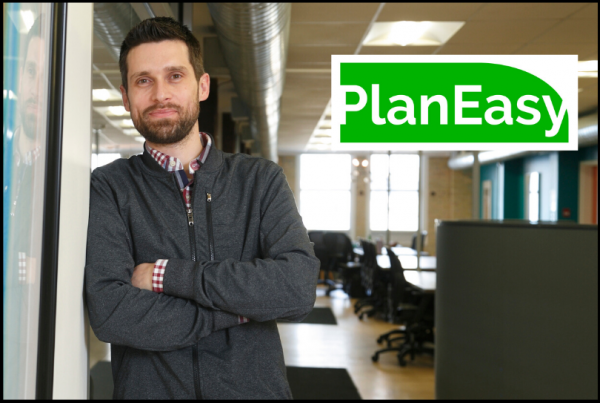
Tell us about yourself
Like many entrepreneurs, I believe there is an enormous gap in the market. I believe that there is a lack of unbiased financial advice and this has a large impact on the average Canadian family. I founded an online financial planning platform called PlanEasy.ca to provide unbiased, advice-only financial planning, at a very reasonable cost.
Starting a business, however, meant transitioning from a 12-year career with Labatt Breweries and essentially starting over. This was a large risk and it required a lot of planning. However, this isn’t my first business. I started a woodworking business while studying Engineering Physics and Management at McMaster University. Each summer I would sell my handcrafted log furniture in cottage country earning as much as $2,000+ in a single weekend. Quickly I learned how important it was to get in front of your ideal customer. My parents are also entrepreneurs, having immigrated to Canada in the 70’s to start a successful tree nursery in southern Ontario. Although I knew starting a business was a large risk, I was excited by how large a problem PlanEasy.ca could help solve.
Tell us about your business
PlanEasy.ca is an unbiased advice-only financial planning platform. There are no products, no commissions, just advice. Our goal is to make advice-only financial planning easy, accessible and inexpensive.
Our clients start their financial plan online and then connect virtually with an advice-only financial planner to customize their financial plan and discuss recommendations. Engagements range from as little as $500 up to $2,000 depending on the client’s complexity and needs. Every financial plan is customized to the clients needs and goals. We help our clients address important questions around their finances and optimize their plan to help them achieve their goals in the best way possible. Most important, though, is that clients have the peace of mind knowing that they’re on track to achieve their financial goals even when the path ahead appears difficult.
What led you to start this business?
I founded PlanEasy because I wasn’t satisfied with existing financial service options. Incentives for clients and traditional financial advisors aren’t necessarily aligned. Clients may second guess the advice they receive from a traditional financial advisor and this can lead to a lack of execution. By providing unbiased financial advice we find that our clients are extremely open with us about their financial goals and current situation.
What were some of the challenges you faced getting started and how did you overcome them?
We’ve faced numerous challenges while building PlanEasy.ca. Some we expected while others we had to figure out. We’ve been fortunate to receive support from many local groups like the Small Business Centre, Innovation Works, TechAlliance, and Ontario Centers of Excellence. We’ve also been fortunate to meet other tech entrepreneurs in London who are also facing similar challenges as they start and scale their businesses. It’s been exciting to share both successes and failures with this vast support network here in London.
What advice would you give to someone starting a small business today?
My advice for new entrepreneurs is to know your market; do as many surveys and client interviews as you can before getting started. Then, be prepared to change or update your business model frequently as you gain more insights into your ideal client. It’s important to be adaptable and flexible because every day is different.
Has your business been impacted by COVID-19?
Because PlanEasy was designed to provide financial advice online we’ve thankfully had only a small impact from COVID-19 thus far. Although we’ve shifted from our office at Innovation Works to our home offices, we’re still meeting with clients on a daily basis online and by phone. We experienced a dip in March and April as people adjusted to the ever changing situation, but now we’re having more and more conversations with potential clients about their short-term finances and their long-term goals. We’re also actively working on our next phase of platform development, which will expand the platform and allow us to introduce an even more affordable financial planning option for clients.
Steven Manuel - Momma's Hummus
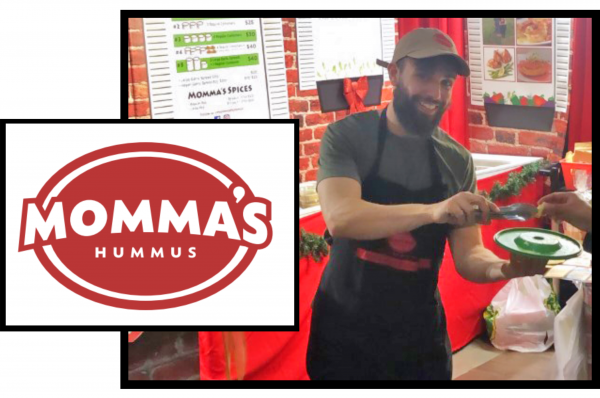
Tell us about yourself
My name is Steven Manuel and I am a first-generation Canadian from a long line of entrepreneurs. As a child, I remember hearing stories about my grandparents’ lives, the hardships they faced and the business they created along the way.
My grandfather passed his entrepreneurial spirit on to his 9 children. This led to a childhood filled with summers and weekends of work. From caterings and markets to nightlife and entertainment, most of my professional career has been built around learning the ins and outs of the family business’.
In 2019 I had decided to focus my efforts on turning my parents’ successful and time-tested hummus recipes into a national brand and staple in our community! Welcome, Momma’s Hummus!
Tell us about your business
We are a small multi-generational family-owned business that has turned our family’s recipes into 12 flavors of high quality, simple ingredient, authentic hummus. Our hummus is small batched, preservative-free and made with Canadian chickpeas and vegetables! We have been sharing our products at events across Ontario for over 20 years as SunSweet-TheGreekChef and in 2019 we have expanded into retailers as Momma’s Hummus!
What were some of the challenges you faced getting started and how did you overcome them?
The biggest challenge I faced while getting started is scheduling my time. Finding a balance between what can be done and what needs to be done each day. Accepting that there are times that things don’t go according to plan and not dwelling in frustration.
What advice would you give to someone starting a small business today?
Dream big, work hard and be realistic. There will be highs and lows but if you love what you are doing and believe in what you are working towards, then you have already won. Surround yourself with positivity and don’t forget to appreciate that you are lucky enough to pursue your passion.
What’s in the future for your business?
We are working on naturally expanding our shelf life, upgrading our packaging and increasing the efficiency of our production process. We aim to expand into retailers across Ontario for Spring 2020!
Josh Reding - MakerBars
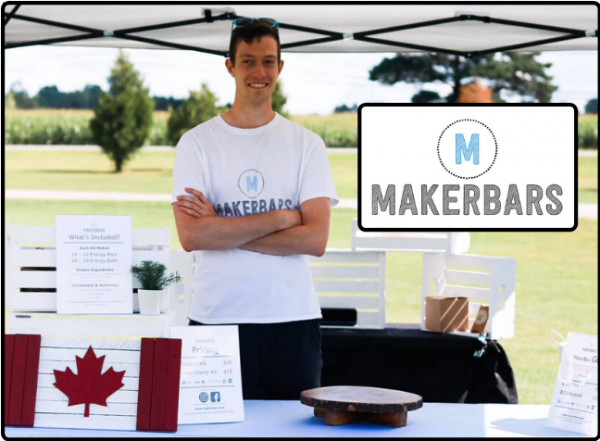
Tell us about yourself
My name is Josh Reding, and I am the founder of MakerBars in London, Ontario! I have been a passionate foodie my entire life since a child cooking in the kitchen next to his mum. My entire family enjoys when I step into the kitchen even when there happens to be too many cooks!
I recently graduated with a dual degree in Integrated Engineering from Western University & HBA from Ivey Business School. I have a strong belief in creating social impact! In high-school I started a Me-to-We club, was involved in Engineering Without Borders through university, and created AgTech Western to showcase innovation in growing unique herbs for restaurants.
MakerBars was inspired by my passion for cooking and innovation! I aim to share the love for cooking with the world by connecting consumers with the food they eat. We focus on sustainable packaging and food systems. Our focus is to become a Fair Trade certified energy bar, which would be one of the first in Canada despite how many bars use ingredients that are available in supply that supports Fair Trade. Fair Trade supports a better living wage for farmers.
Tell us about your business
I’ve just started my journey! I operated my business very part-time in my last year of studies doing some innovation studies and seeing where the idea would take me.
We won a small pitch competition for $250 which sparked the first prototypes and customer development. Since then we’ve grown to selling more than a 1,000 kits and launching a new premade product, MakerBars GO! I began full-time on my business May 2019 and it has grown so much since then participating at the Propel Summer Incubator through Western University and the SBC Scale UP! program. I also just completed a virtual accelerator with League of Innovations which is helping youth lead our community with amazing innovation.
We have one part-time sales student, and will be hiring production staff through 2020! It is an exciting time for MakerBars!
Was there something that drew (or pushed) you into being an entrepreneur?
Being able to be philanthropic one day and have a voice in decisions that affect our society really drives me. We usually call that “an entrepreneur’s second purpose” where they didn’t just create their business for the passion of what they are creating. They also had a second purpose that really ignites them. I hope one day I’ll be in a position to be philanthropic and help build better local community.
I also saw a lot that I didn’t like with how the food industry operated, and what it is doing to our lifestyles. I don’t like how people are losing touch with food, and we need to make ultra processed vegetable patties to convince someone to eat vegetables. There are more rooted problems in society than that type of band-aid solution. It drives me to tackle those problems in the long term.
I’ve always done entrepreneurial things throughout school between starting two school clubs, and several innovative events/fundraisers. So you could say the entrepreneurial bug was always there!
Can you tell us about an entrepreneur you admire and why?
There are quite a few! I really like those who are serial entrepreneurs like Elon Musk and Kevin Hart. They didn’t just stop because they knew they could have a profound impact on society as leaders. Although they are human and have had mistakes, they have created products and services that many people love. They challenge the way things are and push to be very innovative!
What advice would you give to someone starting a small business today?
Don’t go all in, not right away! Despite how much it may feel right, do everything you can to prototype and trial an error. If you want to start a food business, run some markets & use a rental kitchen. If you want to write a book, write a chapter first. If you want to make an app, create a slideshow of what it looks like. If you want to start a clothing company, create some samples first.
Everything is about customer feedback, listening, and delivering better than ‘the other team’ aka your competition!
Take smart risks & have a blast along the way! You’ll be surprised how much you learn!
Nicole VanQuaethem - Simply Nic Nutrition
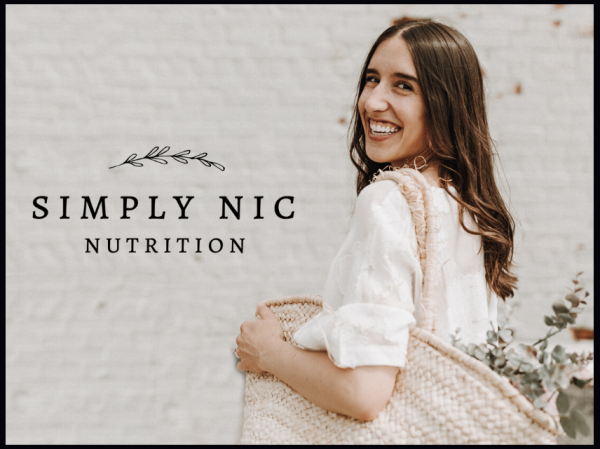
Tell us about yourself
My name is Nicole VanQuaethem and I am a Registered Holistic Nutritionist based out of London, Ontario. I grew up on a farm on the outskirts of Tillsonburg with my parents and two older brothers. From a young age I was involved with helping on the farm and eventually working in the agri-service industry. I completed my undergrad at the University of Western Ontario in Global Development and then completed my Masters of Science in Rural Planning and Development with a focus on local food systems and agri-tourism and culinary tourism in southwestern Ontario.
During my undergrad I had sought the help of a Holistic Nutritionist to help with digestive issues. After working with them and doing a lot of my own research, I started to feel much better and also started to become a lot more passionate about nutrition as a whole. While going to university, I knew I was passionate about rural development and local food systems but wasn’t sure how to merge my two interests together. After completing my masters, I finally decided to make the move and complete my designation to become a Registered Holistic Nutritionist and open up my own practice to help others improve their health and wellness.
Tell us about your business
I have been operating for about 2.5 years and now run my practice primarily online allowing me to reach clients from outside of the City of London. I work with clients one-on-one and create custom nutrition and wellness protocols and menu plans, as well as in group settings. Throughout the year I also attend events and host cooking workshops to help give people the skills they need in order to eat healthier. On my online shop, I also have a variety of digital and physical products ranging from t-shirts to cookbooks.
What led you to start this business?
Growing up, I experienced a lot of digestive issues and constant headaches which eventually turned to migraines. With many doctors visits, I wasn’t getting anywhere and was given band-aid solutions. It wasn’t until I reached out to a Holistic Nutritionist during my undergrad that I started to see improvements in my overall health. With that initial support followed by quite a bit of trial and error, I started to feel drastically better. A few years later, while I was actually finishing up the end of my nutrition program and starting my business, I was diagnosed with Non-Hodgkin’s lymphoma. Although this was a challenging and my body went through a lot physically and mentally, I realized that I had so many powerful tools from my personal experience and training and nutrition which helped support my body through that journey. It was during this time that I realized how passionate I was and that I needed to pursue this business in order to help others.
As a busy entrepreneur, what do you like to do when you take a break?
As a wellness professional, I think it’s important to take breaks and take care of ourselves. Although I still find it challenging, I enjoy going for walks and hikes outdoors, trying new restaurants, and reading something business or nutrition related.
What are some of the challenges you faced getting started and how did you overcome them?
First was my mindset around my health. I was worried that people would treat me differently or clients would be turned away with what I was going through. As mentioned previously, it was this experience that made me realize that I actually needed to share not only my passion for nutrition but my personal health journey.
Another challenge I faced was deciding whether or not to have a physical space. Although a physical space seemed attractive, there were high costs associated with that which were worrisome as a new business owner. I decided to then market myself as an online coach which not only cut down on costs, but also allowed me to reach a wider client base and made it more convenient for the clients to take calls.
Lastly, as someone who doesn’t like numbers, I found it challenging to do my own bookkeeping. That ended up being one of the first things I outsourced, which saved a lot of time and stress!
